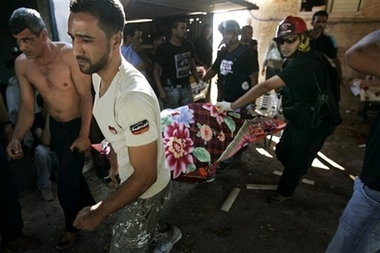BEIRUT, Lebanon - Israel and Hezbollah sharply intensified fighting Saturday
with airstrikes, rocket attacks and brutal ground fighting - an apparent
bid to inflict maximum mutual damage even as the United States and France agreed
on a draft U.N. resolution calling for a halt to the violence.

The body of a victim
is carried from the scene of a rocket attack that killed three women of
the same family in the town of Arab el Aramsheh in northern Israel,
Saturday, Aug. 5, 2006. Dozens of Hezbollah rockets slammed into
communities across northern Israel on Saturday.
[AP] |
Even if the U.N. Security Council adopts the resolution early next week as
expected, the task of winning agreement from the warring parties portended a far
more bumpy diplomatic road than the one already traveled.
As it became clear a U.S.-French agreement on the text was drawing near,
Israeli-Hezbollah fighting grew particularly intense over the past few days.
Israeli commandos battled Hezbollah guerrillas in a dramatic raid on an
apartment building in the southern port city of Tyre on Saturday, while
warplanes blasted south Beirut. The fighting across Lebanon killed at least
eight Lebanese and two Israeli soldiers, while a Hezbollah rocket volley killed
three women in northern Israel.
Shortly after the diplomatic agreement was announced on the 25th day of the
conflict, a Hezbollah Cabinet minister said militant Shiite guerrillas would not
stop fighting until all Israeli troops leave Lebanon. The draft resolution makes
no such demand.
"We (will) abide by it on condition that no Israeli soldier remains inside
Lebanese land. If they stay, we will not abide by it," said Mohammed Fneish, one
of two Hezbollah members of the government.
An Israeli Cabinet minister said Israel, too, had no intention to end its
offensive for the time being.
"The Israeli military continues to act in the meantime, without letup, in
many areas," Tourism Minister Isaac Herzog said. "We still have the coming days
for many military missions, but we have to know that the timetable is becoming
increasingly shorter."
Israeli Prime Minister Ehud Olmert met with senior ministers late Saturday.
They approved continuation of the Lebanon offensive according to the present
guidelines but did not discuss the draft U.N. resolution, officials said,
speaking on condition of anonymity because they were not authorized to talk to
reporters.
The Lebanese government said it objected to portions of the U.S-French draft
resolution and would demand that some provisions be amended.
"The government has objected to the U.S-French draft resolution. It has made
amendments to some of the provisions and has sent them to Lebanon's U.N.
representative," an aide to Prime Minister Fuad Saniora told The Associated
Press late Saturday.
The aide, speaking on condition of anonymity because he was not authorized to
make statements to the media, insisted that the government's position did not
amount to a flat rejection of the draft resolution.
As written, the resolution would be a difficult, if not impossible, pill for
Hezbollah to swallow, particularly language calling for the "unconditional
release" of two Israeli soldiers captured by the guerrillas in a cross-border
raid July 12. The hostage taking prompted the Israeli onslaught in Lebanon.